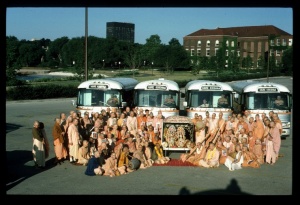SB 7.15.20

A.C. Bhaktivedanta Swami Prabhupada
TEXT 20
- kāmasyāntaṁ hi kṣut-tṛḍbhyāṁ
- krodhasyaitat phalodayāt
- jano yāti na lobhasya
- jitvā bhuktvā diśo bhuvaḥ
SYNONYMS
kāmasya—of the desire for sense gratification or the urgent needs of the body; antam—end; hi—indeed; kṣut-tṛḍbhyām—by one who is very hungry or thirsty; krodhasya—of anger; etat—this; phala-udayāt—by venting chastisement and its reaction; janaḥ—a person; yāti—crosses over; na—not; lobhasya—greed; jitvā—conquering; bhuktvā—enjoying; diśaḥ—all directions; bhuvaḥ—of the globe.
TRANSLATION
The strong bodily desires and needs of a person disturbed by hunger and thirst are certainly satisfied when he eats. Similarly, if one becomes very angry, that anger is satisfied by chastisement and its reaction. But as for greed, even if a greedy person has conquered all the directions of the world or has enjoyed everything in the world, still he will not be satisfied.
PURPORT
In Bhagavad-gītā (BG 3.37) it is stated that lust, anger and greed are the causes of the conditioned soul's bondage in this material world. Kāma eṣa krodha eṣa rajo-guṇa-samudbhavaḥ. When strong lusty desires for sense gratification are unfulfilled, one becomes angry. This anger can be satisfied when one chastises his enemy, but when there is an increase in lobha, or greed, which is the greatest enemy caused by rajo-guṇa, the mode of passion, how can one advance in Kṛṣṇa consciousness?
If one is very greedy to enhance his Kṛṣṇa consciousness, this is a great boon. Tatra laulyam ekalaṁ mūlam. This is the best path available.